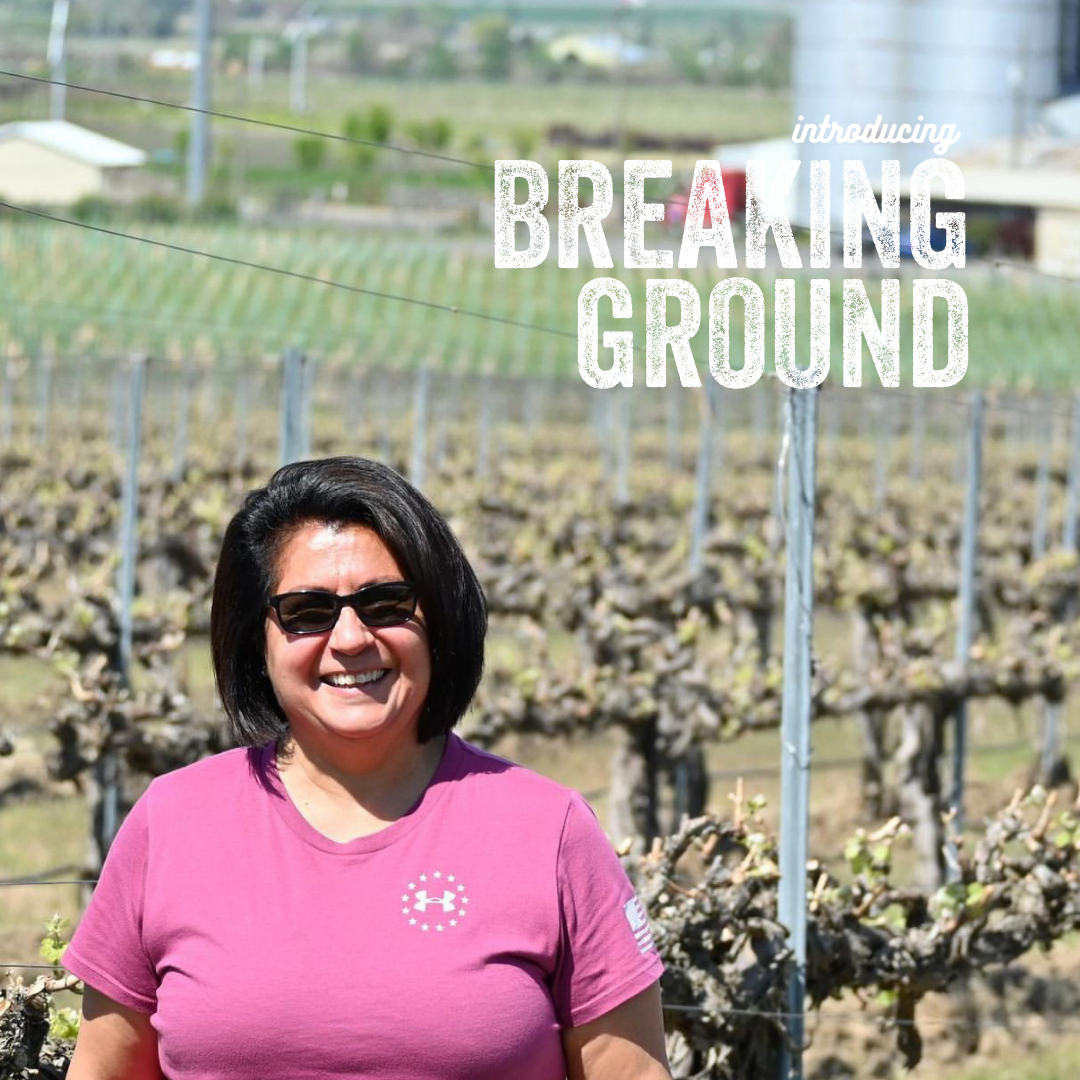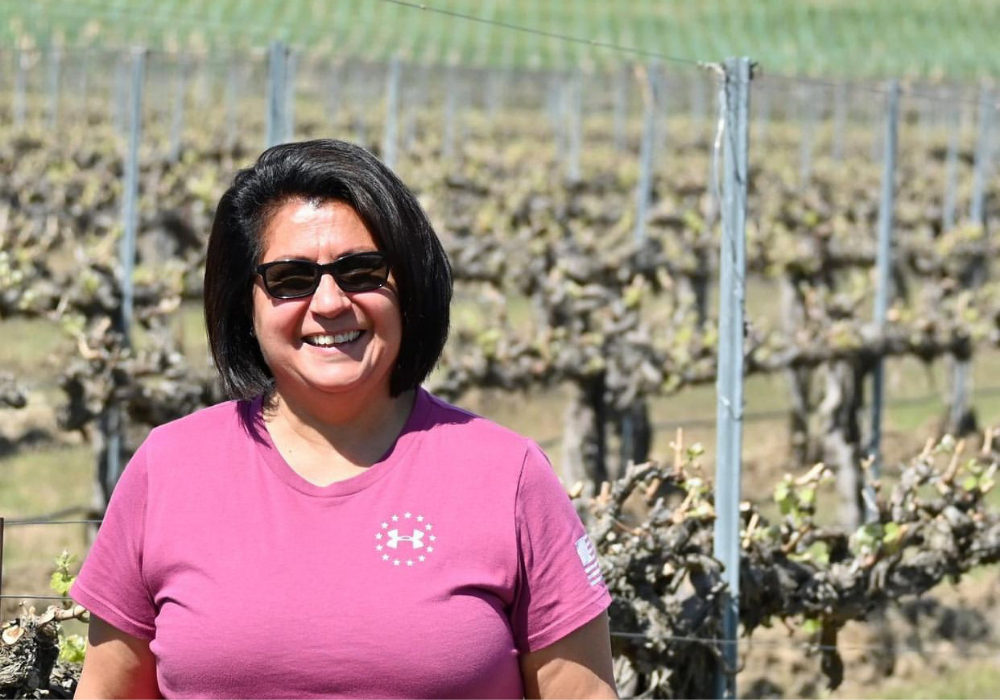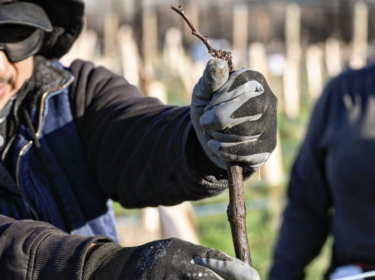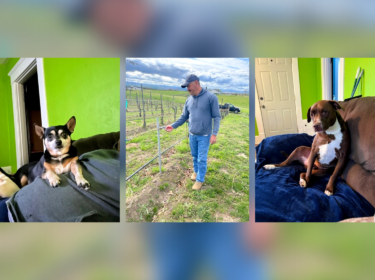“Le dije a mi papá antes de que falleciera, estoy completando este círculo.”
Meet Rosanna Lugo, HR Specialist at North Slope Management in the Walla Walla Valley. “My role isn’t a typical HR position, in that I’m not sitting at a desk all day, every day. I’m actually out there with crews, making sure that we’re all in compliance with the regulations that are coming down on us every second, and making sure that the workers are wearing their masks, have enough hand sanitizer, wipes, Lysol, gloves, and glasses.” Both at work, and here with us in this program, translation is a big part of Rosanna’s work. She’s an ambassador in every sense of the word, and has been her whole life: she comes to the Washington Wine industry after a 30+ career working for the state in their employment securities department, where Rosanna helped folks that had become unemployed get back into the workforce.
I have a lot of fun, let me tell you.—Rosanna Lugo, North Slope Management
Translated by Rosanna Lugo
Washington Wine: On an average day, how many hats do you wear?
Rosanna Lugo: I have a lot of fun, let me tell you. I work for Dry Creek Agriculture located on Seven Hills Vineyard. I am their HR Compliance person, but my role isn’t a typical HR position, in that I’m not sitting at a desk all day, every day. I’m actually out there with crews, making sure that, one, we’re in compliance with all of the regulations that are coming down on us every second. Making sure that they’re wearing their masks, ensuring that they have enough masks, ensuring that they have enough hand sanitizer, wipes, Lysol, gloves, and glasses. Making sure that all their PPE is in order and sufficiently available to them.
The other part of that is I work with them around rules and regulations as far as their rights as workers. I’m that liaison between Sadie, the Vineyard Manager, and those workers, so I’m also interpreting constantly. I lead all the safety meetings with Sadie—we have our safety meetings monthly—and that’s just to keep them abreast of everything that’s going on, any changes that we need to make, and what things are looking like. And now here real soon, we’ll be talking about harvest. So I’m kind of like the Jack of all trades, master of none.
I’m that liaison between the Vineyard Manager and workers, so I’m interpreting constantly.
Washington Wine: How difficult has that been to juggle all those hats, especially with all the changes that the pandemic has brought and continues to bring?
Rosanna: Well, over 90% of our workforce is vaccinated. One of the things that we all agreed on from the very beginning—after I dispelled a lot of the myths—was that we wanted to stay safe for not only ourselves, but for our families. I was able to facilitate those vaccines with our crew to help them get them and feel safe at work, which is where we spend the majority of our time.
WW: Tell me a little bit about the crew.
Rosanna: Right now, we have 14 men on one crew, including the supervisor, and for the women, holy camoly, we have around 21. I know there’s more women than men working for us this year. And that’s just by luck, I guess, because we accept all kinds of applications from the beginning of the year. They range from, I’m going to say 30 to 65, as far as age range for the women and for the men this year. We were able to hire some youth, which we were very excited about. So we have people from age 17 to 67 on our crew, almost hitting those seventies.
It’s a big range in age, and they are very focused in their work. They love to have a good time while they’re working. They’re talking, they’re listening to music, and really trying to make sure that the work that they’re doing meets the expectation of what Sadie needs for all of the winemakers and folks like that, to make sure that the grapes are looking good. It’s a real fun group.
WW: And how about yourself. How long have you been with the crew?
Rosanna: Today is actually my third-year anniversary with this company. The most tenured staff that we have right now, aside from the foreman–because he’s been here since inception in the ’90’s—has been here for 22 or 23 years.
WW: How did you find your way into being the HR Specialist?
Rosanna: I started working for Norm McKibben at Pepper Bridge Winery, I want to say, five years ago. I started out as a volunteer, just kind of helping out with events, washing their dishes and the glasses, putting them way, and picking up at the end of any events that they had. I became very familiar with what it takes to pour the wine: that story is behind the vineyards, winery, owners, and winemakers.
At the same time, because I was only working the weekends there, I was also working for the State of Washington. I worked for the State of Washington for 30 plus years and was able to finally retire at the age of 55 in 2018. At that time, Norm came to me and he’s like, “I really need someone up at the vineyard and I need someone in this role.” He explained the role to me, and I said, “Well, I’m not ready to retire yet.” And this was earlier in 2018. He says, “Well, when are you going to retire?” I said, “Well, I don’t think I’m eligible for retirement until I turn 55, which would be in June, and then I think I have to wait a month before everything closes out.” And he goes, “Okay, so when can you start for me?” I said maybe August, he goes, “Okay, so August 13th.” And that’s when I started working for him.
WW: Tell us a little bit about your first career, working for the state for 30 years.
Rosanna: Thirty-four years to be exact. I worked for employment securities, called WorkSource, helping folks that had become unemployed get back into the workforce, whether it was helping them with their job search techniques and/or sending them back to school to obtain the necessary certifications in order to become competitive in the workforce. It was so much fun.
I was sad: it was bittersweet for me at that very point because there were so many changes going on, but I was a public servant for my whole life. I told my dad before he passed, I said, “I’m making this full circle.” I’m coming from a migrant family—which worked in agriculture—went to school, was able to get a high school diploma, and go to work in an office setting for these many years. And now, I’m back in the agricultural field, which is just so amazing.
We’re the unsung heroes. It’s about finding out what are your needs and how can I facilitate that to help you get what you need in order to make your job easier for what you’re doing for this company.
We’re the unsung heroes.—Rosanna Lugo
WW: Do you know where that interest came from for you to be a public servant? Was it an opportunity or interest or mixture of both?
Rosanna: That’s a very good question. In high school, because I had earned my credits my junior year, during my senior year, I was kind of like a lost soul on the high school campus. And I had a counselor—a career counselor—come up to me, and he goes, “Let’s put you to work.” They had me go work for the Social Security Administration, and I totally fell in love with that. And I thought, you know what? I thought, This is where I need to be. I need to be helping people, help them get what they need. And I just kind of fell into state government via another job I had working at a Daycare Facility as a bus aide. The director was the sister of the manager at that time for the Walla Walla office. She had us connect, and the rest is history. And back then, we were filing unemployment. We had the portion of filing unemployment insurance claims. That was my main focus when I first started back in 1980 something.
WW: I can only imagine the amount of changes you’ve seen then, in employment but also just in how you interface with people, technologies, and opportunities.
Rosanna: Let me tell you that as technology kept coming in, I was seeing that our limited English population was being left behind. And so how could I come to the table and bring the resources that are needed to help that population not have us lose them? We were able to bring on a Spanish GED class and ESL on-site for the evenings after they got off work. And we helped them just do the basics: how to set up a profile so that when they had to file their claim for unemployment insurance. They needed that in order to get into the system in the first place. And so I thought, “Yep, I need to stay helping our Latino community.”
I need to stay helping our Latino commuity.—Rosanna Lugo
WW: Earlier, you referenced your migrant story. Was that your parents then that moved over into the States?
Rosanna: Yes, my grandfather back in the 1900’s, he was a laborer which in today’s world is your H2A worker, or your foreign worker. He would come over, do the crop, and head back over to Mexico. At some point, he was able to stay in the state of Texas with my grandmother, and that’s where my folks—my mother and my dad—were born: in Texas. And then, as a whole family, they began to migrate all over the United States, following the crops for that season, and then they would head back to Texas. Finally, when my mom and dad married in 1956, they settled in Walla Walla. As we were being born, we would travel just the Pacific Northwest. We’d actually just do Washington, Oregon, Idaho. Those would be the three states that we migrated to as a family.
Washington Wine: So you then grew up in agriculture, which you referenced earlier when you said working in wine was “closing the loop.” What was it like growing up in Walla Walla?
Rosanna: Yes, we lived in Lowden, which is a little town right out of Walla Walla. And I went to school there for first and second grade, where L’Ecole 41 is now. That schoolhouse, that’s where I went to school. We lived right across the street, and I would go to school barefoot. I’d get in trouble, but I didn’t care. And then our parents moved us to the city of College Place, and that’s where we continued to go to elementary, middle, and high school. But right where L’Ecole’s tasting room is, is where our first, second, and third grade classes were.
WW: I hope we get to hear more about these memories, and all the of the changes you have witnessed during this series: the stories we tell, and the ones we don’t know about. But I’m curious, what keeps you going these days? What keeps you inspired?
Rosanna: You know, I think for me, the reward is to see the crews being able to do the work that they need to do. By me giving them the most basic thing, as far as gloves or new scissors or new clippers, for me, that’s a reward. To see that they’re getting their paychecks timely. That they’re getting their money’s worth for the work that they do in a day, that’s my reward, that’s what keeps me going. And that’s what I’ve always said, even when I worked for the state government. Seeing somebody get their GED and having them literally come back to me and say, “Lady, I got my GED finally, thank you.” Or “Lady, I got this job finally, thank you.” That was my reward.
I just put somebody back to work when they were struggling at their worst time. That’s what I listen for here. How do I connect? How do we help those families get what they need during the most awful time? How do I help facilitate that? And a gentleman, one of our other workers just passed away. Not to bring this down, but, I was able to get them connected with the hospital for resources to help them with some of the finances that they’re not able to cover because they have no insurance.
If I can do this, what else can I do for these people in order to help them keep going?
If I can do this, what else can I do for people in order to help them keep going?—Rosanna Lugo
WW: I’m very sorry to hear about that loss. I imagine everyone feels it deeply, as it seems like this community has the feeling of family.
Rosanna: I can definitely tell you that, personally. Like I said, I’ve been working with the crew, this is my third year. Some of them, it’s been their first year. And on the day of the service of my dad, as I was coming out of the church, as I was turning around, I kept seeing some of our crew come out and finally, I had to ask them, I said, “So who stayed at work? Everybody is here.” It just was jaw dropping. And they said, “We all came.” Even the foreman came. I couldn’t stop crying. I was very appreciative. Not knowing my dad, but the respect they had for me.
There’s that connection. The human connection that really needs to happen, because I have their back, they have my back, and Sadie has all of our backs. There’s a true crew right there.
WW: I’m so sorry to hear about your loss, Rosanna, and am a bit speechless listening to you talk about the way you and your crew support and surround each other. You have each others’ backs, and your ways back.
Rosanna: Thank you. And yes, exactly. We have our ways back.
WW: You mentioned Sadie. I’ve loved seeing her Farmer Friday series that she does. What’s that been like for the crew?
Rosanna: It’s been really fun just to listen to the crew, each crew member tell their story of where they’re coming from and what they do and why they like it. I thoroughly enjoy all of it all the time.
WW: What kinds of changes are you seeing or what types of things are you advocating for to help the harvest crew and the Latinx community get the resources they need?
Rosanna: Well, definitely one of the things that Sadie and I talk about, obviously, is that I got to keep COVID in the center. How do we get information on-site? We’re so far away from the town. How do we bring resources here so that we can get them immediate information besides through me? What other resources can we try and get out there?
That’s one of the things that we’ve been going back and forth on as well as in the winter, what is it that we can offer our crew as far as educational pieces to help them stay connected with maybe learning a little bit, how to speak a little bit more English, how do we get them books so that they can practice at home? So those kinds of things are the ideas that we’ve been kind of tossing around, but that we really haven’t had a chance to really sit down and hammer any of those ideas out.
WW: Final questions, and they are random. What is your favorite non-musical sound?
Rosanna: I love to hear the early morning. You’re going to laugh at me, but just because I was raised on a farm, I love to hear the roosters. What else? I think that’s it, but I definitely love the rain and I love the roosters.
WW: And how about things that you do outside of work. Are you an outdoor person? Do you like reading? Do you like fireplaces?
Rosanna: I love the Harry Potter series. I love to go out for walks and right now, I haven’t unfortunately. This kind of took me back, but I had already been training for that half marathon. I had already started, had accomplished my first 12-mile walk prior to Dad’s death, but I was making those strides. That was really, really motivating me to walk that far in a short period of time and I need to. So I love to walk. I love to dance. I was in some Zumba classes for a while, so love to dance.
WW: Do you have a go-to song for Zumba that you love dancing to?
Rosanna: Pit Bull.
WW: When I grow up, I want to be Rosanna Lugo.
Rosanna: [Laughs]. Be my guest.
There’s that connection. The human connection that really needs to happen, because I have their back, they have my back, and Sadie has all of our backs. There’s a true crew right there.—Rosanna Lugo, North Slope Management




